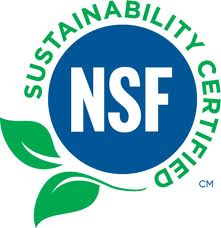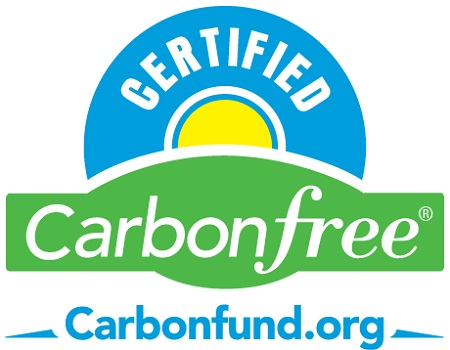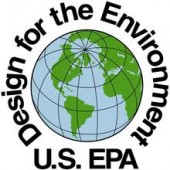By Vicki Matranga, Design Programs Coordinator
Environmental claims: What does green really mean?

Sustainability is vital to a company’s performance strategy and brand image. At the 2012 International Home + Housewares Show, we heard from industry insiders at the Innovation Theater and the Going Green display about environmentally sustainable materials, reduced use of natural resources in production, more efficient packaging and legal issues in advertising.
Our series of blog posts updates what was presented at the Show as we continue the conversation with some of the industry leaders who appeared there. At the Going Green display, NSF International representatives educated visitors about validating environmental claims. NSF International is an independent organization that writes standards, and tests and certifies products for the food, water and consumer goods industries to minimize adverse health effects and protect the environment. Founded in 1944, NSF is committed to protecting human health and safety worldwide. NSF is a World Health Organization Collaborating Centre for Food and Water Safety and Indoor Environment.
 We’re here with Tom Bruursema, General Manager of NSF International’s Sustainability Program. He’s a sustainability expert with more than 25 years of experience in product certification and professional accreditation in domestic and international markets. He heads NSF International’s Sustainability Program, which helps companies develop standardized, objective methods of measuring sustainability that instill marketplace confidence and promote acceptance of more sustainable products and services. These services include standards development, product assurance and certification, advisory services and quality systems management to help companies green their products, operations, systems and supply chains.
We’re here with Tom Bruursema, General Manager of NSF International’s Sustainability Program. He’s a sustainability expert with more than 25 years of experience in product certification and professional accreditation in domestic and international markets. He heads NSF International’s Sustainability Program, which helps companies develop standardized, objective methods of measuring sustainability that instill marketplace confidence and promote acceptance of more sustainable products and services. These services include standards development, product assurance and certification, advisory services and quality systems management to help companies green their products, operations, systems and supply chains.
Tom, we know that information in the marketplace about a product’s green attributes can be confusing. What can be done to help consumers understand and trust what a company says about its products?
As consumer demand for sustainable products grows, so does the need for reliable and verifiable environmental claims. We often see “green,” “eco-friendly” or “recyclable” on product labels, but what do these claims actually mean? Who decides what “green” entails and who verifies that products meet these rules?
Government, industry associations and consumer groups are holding companies to higher standards of performance on environmental claims through emerging guidelines and regulations. For example, the U.S. Federal Trade Commission (FTC) states that “Green claims – including representations about energy savings – must be backed up by competent and reliable scientific evidence.”
The value of environmental claims rests on the assurance that the information provided is credible, objective and easily identifiable and understood by consumers. Substantiated claims not only help consumers make more informed purchasing decisions, but they help companies differentiate and “authenticate” their products.
What’s the latest that manufacturers and retailers should be aware of?
The U.S. FTC recently updated its Green Guides[1] with more specific guidelines on environmental claims. The revised guides encourage marketers to use only qualified certifications and seals of approval that specify the basis for the certification, instead of making general environmental product claims. Specific rules apply to specific claims (such as “eco-friendly,” ” recyclable” and “compostable”).
In Canada, the Competition Act, Consumer Packaging and Labeling Act and Textile Labeling Act cover environmental label claims. In particular, the Competition Act prohibits false or misleading performance assertions.
What can companies do prepare and protect themselves?
Companies can prove their environmental product claims through independent, third-party testing, like the NSF Sustainability Environmental Claims Validation Program. Such validation protects a product or service against perceptions or charges of “greenwashing” and helps strengthen customer trust.
 Many environmental claims can be validated, including:
Many environmental claims can be validated, including:
|
Claims vary widely by product and industry and custom programs can fill specific needs. For example, NSF developed test methods to verify that Proctor & Gamble’s Future Friendly® products save water and energy and reduce waste. NSF verified claims such as “Tide Coldwater offers up to 80 percent energy savings for the consumer in every load.”[2]
In addition, NSF Sustainability is a partner in the Biodegradable Products Institute’s Certified Compostable program, Carbonfund.org’s Carbonfree® Product Certification and the EPA’s Design for the Environment (DfE) program.

The BPI Certified Compostable program applies science-based testing to prove a material will compost in a municipal or commercial facility, leaving no toxic or plastic residues in the soil. Examples of certified products include compostable bags, foodservice items, resins and packaging materials.
Carbonfree® certification defines a product as carbon neutral by determining its carbon footprint and encouraging companies to reduce it as much as possible and offset remaining emissions through third-party validated carbon reduction projects. Carbonfree® certification can build marketplace credibility and distinction for a brand wanting to tout sustainable attributes.
 DFE recognition designates that each ingredient in a wide range of goods (including cleaning, personal care and fire suppression products) has been scientifically screened to use chemicals safer for human health and the environment.
DFE recognition designates that each ingredient in a wide range of goods (including cleaning, personal care and fire suppression products) has been scientifically screened to use chemicals safer for human health and the environment.
For each of these programs, environmental or performance declarations are scientifically confirmed through testing, auditing or both to provide a sound basis for the product claim. Verified claims provide a marketing advantage for the company making the claim and an assurance for consumers that they can trust the claim.
Thank you, Tom, for clarifying these terms and for guiding our readers to sources where they can learn more. Green labeling includes many complex questions. Scientific testing can contribute to more accurate marketing claims that will educate consumers who want to make responsible choices.

Learn more about NSF’s many activities at www.nsf.org.
NSF Sustainability draws upon this expertise in standards development, product assurance and certification, advisory services and quality management systems to help companies green their products, operations, systems and supply chains. Through its National Center for Sustainability Standards, NSF has developed sustainability standards for product categories such as chemicals, building products and materials, and water quality. NSF works with leading regulators, scientists, engineers, public health and environmental health professionals, and industry representatives to develop these transparent, science-based standards, protocols and product category rules.
[1] Officially called Part 260 – Guides for the Use of Environmental Marketing Claims
[2] Based on energy calculations, heating of water accounts for over 80 percent of energy use for traditional top-loading washers (NSF analysis).


